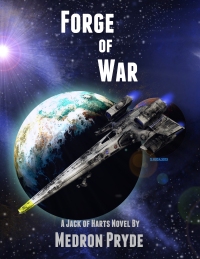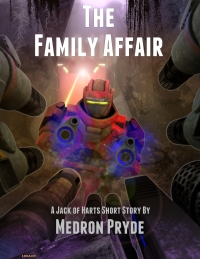We found hyperspace in 2105 and the Great Space Race began. Alliances, nations, corporations, and religions reached out for the stars and humanity spread beyond the Solar System. We learned the answer to one of the oldest questions of all time in 2205. Are we alone? They brought medicines with them that nearly wiped out diseases, and extended the human lifespan into the centuries. They helped us study advanced technologies, and we expanded our colonies hundreds of lightyears from Earth. It was a golden age that many thought would never end.
Jack grew up in a world at peace, his only interests, partying and girls. But then an alien sneak attack killed millions of Americans, and wiped out almost everything and everybody Jack knew. He volunteered to serve and kick the alien scum back to the other side of the galaxy. But the Marines wanted more than people looking for revenge, and cybernetic partners demanded a far higher commitment. If Jack wanted to earn his commission as a Marine Corps fighter pilot, he had to grow up. He had to let himself be forged into something stronger than he’d ever wanted to be. He had to live up to the name of his squadron.
The Republic of Texas Marine Corps Fighter Attack Squadron 112. The Cowboys.

 The Martian Affair on Amazon
The Martian Affair on Amazon Forge of War on Amazon
Forge of War on Amazon The Audacious Affair on Amazon
The Audacious Affair on Amazon Angel Flight on Amazon
Angel Flight on Amazon Angel Strike on Amazon
Angel Strike on Amazon Angel War on Amazon
Angel War on Amazon The Family Affair on Amazon
The Family Affair on Amazon The Thunderbird Affair on Amazon
The Thunderbird Affair on Amazon Wolfenheim Rising on Amazon
Wolfenheim Rising on Amazon Wolfenheim Emergent on Amazon
Wolfenheim Emergent on Amazon The Gemini Affair on Amazon
The Gemini Affair on Amazon